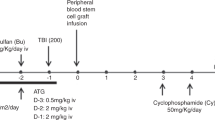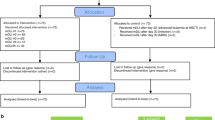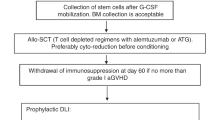Abstract
Treatment of relapse of hematological malignancies following allogeneic hematopoietic SCT (allo-HSCT) remains very challenging and relies usually on the readministration of chemotherapy combined with donor lymphocyte infusion (DLI). To enhance DLI effectiveness, lymphodepletion (LD) with fludarabine (Flu) and/or CY before the injection of lymphocytes is an attractive modality to modify the immune environment, leading possibly to suppression of regulatory T cells (Treg) and exposing the patient to cytokine activation. However, LD before DLI may lead to induction of deleterious GVHD. To avoid inducing overwhelming toxicity, we proceeded by escalating doses of both LD and DLI. Eighteen patients with various non-CML hematological malignancies who relapsed following allo-HSCT were treated with chemotherapy and LD-DLI or LD-DLI upfront. T-cell subpopulation and DC levels as well as cytokine plasma levels (IL-7, IL-15) were measured before and following LD-DLI. Cumulative incidence of acute grade II–IV GVHD was 29.4% similar to that reported in patients receiving DLI without LD. In addition, Flu alone with low dose of DLI was not associated with severe GHVD. CY/Flu at the respective doses of 600 mg/m2 on day 1 and Flu 25 mg/m2/day on days 1–3 did not result in a marked decrease of Treg cells, nor in endogenous IL-7 and IL-15 production. However, a peripheral expansion of DCs was observed. These findings suggest that the escalated dose procedure appears safe and prevent overwhelming toxicity. A dose-limiting toxicity has not yet been reached.
This is a preview of subscription content, access via your institution
Access options
Subscribe to this journal
Receive 12 print issues and online access
$259.00 per year
only $21.58 per issue
Buy this article
- Purchase on Springer Link
- Instant access to full article PDF
Prices may be subject to local taxes which are calculated during checkout




Similar content being viewed by others
References
Shaw BE, Russell NH . Treatment options for the management of acute leukaemia relapsing following an allogeneic transplant. Bone Marrow Transplant 2008; 41: 495–503.
Porter DL, Alyea EP, Antin JH, DeLima M, Estey E, Falkenburg JH et al. NCI First international workshop on the biology, prevention, and treatment of relapse after allogeneic hematopoietic stem cell transplantation: report from the committee on treatment of relapse after allogeneic hematopoietic stem cell transplantation. Biol Blood Marrow Transplant 2010; 16: 1467–1503.
Kolb HJ, Mittermüller J, Clemm C, Holler E, Ledderose G, Brehm G et al. Donor leukocyte transfusions for treatment of recurrent chronic myelogenous leukemia in marrow transplant patients. Blood 1990; 76: 2462–2465.
Kolb HJ . Graft-versus-leukemia effects of transplantation and donor lymphocytes. Blood 2008; 112: 4371–4383.
Dazzi F, Szydlo RM, Cross NC, Craddock C, Kaeda J, Kanfer E et al. Durability of responses following donor lymphocyte infusions for patients who relapse after allogeneic stem cell transplantation for chronic myeloid leukemia. Blood 2000; 96: 2712–2716.
Dazzi F, Szydlo RM, Craddock C, Cross NC, Kaeda J, Chase A et al. Comparison of single-dose and escalating-dose regimens of donor lymphocyte infusion for relapse after allografting for chronic myeloid leukemia. Blood 2000; 95: 67–71.
Porter DL, Collins Jr RH, Hardy C, Kernan NA, Drobyski WR, Giralt S et al. Treatment of relapsed leukemia after unrelated donor marrow transplantation with unrelated donor leukocyte infusions. Blood 2000; 95: 1214–1221.
Schmid C, Labopin M, Nagler A, Bornhäuser M, Finke J, Fassas A et al. Donor lymphocyte infusion in the treatment of first hematological relapse after allogeneic stem-cell transplantation in adults with acute myeloid leukemia: A retrospective risk factors analysis and comparison with other strategies by the EBMT Acute Leukemia Working Party. J Clin Oncol 2007; 25: 4938–4945.
Muranski P, Boni A, Wrzesinski C, Citrin DE, Rosenberg SA, Childs R et al. Increased intensity lymphodepletion and adoptive immunotherapy, how far can we go? Nat Clin Pract Oncol 2006; 3: 668–681.
Klebanoff CA, Khong HT, Antony PA, Palmer DC, Restifo NP . Sinks, suppressors and antigen presenters: how lymphodepletion enhances T cell-mediated tumor immunotherapy. Trends Immunol 2005; 26: 111–117.
Greenberg PD . Therapy of murine leukemia with cyclophosphamide and immune Lyt-2+ cells: cytolytic T cells can mediate eradication of disseminated leukemia. J Immunol 1986; 136: 1917–1922.
Awwad M, North RJ . CYclophosphamide (CY)-facilitated adoptive immunotherapy of a CY-resistant tumour. Evidence that CY permits the expression of adoptive T-cell mediated immunity by removing suppressor T cells rather than by reducing tumour burden. Immunology 1988; 65: 87–92.
Miller JS, Weisdorf DJ, Burns LJ, Slungaard A, Wagner JE, Verneris MR et al. Lymphodepletion followed by donor lymphocyte infusion (DLI) causes significantly more acute graft-versus-host disease than DLI alone. Blood 2007; 110: 2761–2763.
O’Reilly RJ, Dao T, Koehne G, Scheinberg D, Doubrovina E . Adoptive transfer of unselected or leukemia reactive T cells in the treatment of relapse following allogeneic hematopoietic transplantation. Semin Immunology 2010; 22: 162–172.
Slavin S, Naparstek E, Nagler A, Ackerstein A, Samuel S, Kapelushnik J et al. Allogeneic cell therapy with donor peripheral blood cells and recombinant human interleukin-2 to treat leukemia relapse post-allogeneic bone marrow transplantation. Blood 1996; 87: 2195–2204.
Porter DL, Levine BL, Bunin N, Stadtmauer EA, Luger SM, Goldstein S et al. A phase 1 trial of donor lymphocyte infusions expanded and activated ex vivo via CD3/CD28 costimulation. Blood 2006; 107: 1325–1331.
Warren EH, Fujii N, Akatsuka Y, Chaney CN, Mito JK, Loeb KR et al. Therapy of relapsed leukemia after allogeneic hematopoietic cell transplantation with T cells specific for minor histocompatibility antigens. Blood 2010; 115: 3869–3878.
Dummer W, Niethammer AG, Baccala R, Lawson BR, Wagner N, Reisfeld RA et al. T-cell homeostatic proliferation elicits effective antitumor autoimmunity. J Clin Invest 2002; 110: 185–192.
Gattinoni L, Finkelstein SE, Klebanoff CA, Antony PA, Palmer DC, Spiess PJ et al. Removal of homeostatic cytokine sinks by lymphodepletion enhances the efficacy of adoptively transferred tumor-specific CD8+ T cells. J Exp Med 2005; 202: 907–912.
Wrzesinski C, Paulos CM, Kaiser A, Muranski P, Palmer DC, Gattinoni L et al. Increased intensity lymphodepletion enhances tumor treatment efficacy of adoptively transferred tumor-specific T cells. J Immunother 2010; 33: 1–7.
Brode S, Cooke A . Immune-potentiating effects of the chemotherapeutic drug cyclophosphamide. Crit Rev Immunol 2008; 28: 109–126.
Ghiringhelli F, Larmonier N, Schmitt E, Parcellier A, Cathelin D, Garrido C et al. CD4+CD25+ regulatory T cells suppress tumor immunity but are sensitive to cyclophosphamide which allows immunotherapy of established tumors to be curative. Eur J Immunol 2004; 34: 336–344.
Mitsuoka A, Baba M, Morikawa S . Enhancement of delayed hypersensitivity by depletion of suppressor T cells with cyclophosphamide in mice. Nature 1976; 262: 77–78.
Rollinghoff M, Starzinski-Powitz A, Pfizenmaier K, Wagner H . CYclophosphamide-sensitive T lymphocytes suppress the in vivo generation of antigen-specific T lymphocytes. J Exp Med 1977; 145: 455–459.
North RJ . CYclophosphamide-facilitated adoptive immunotherapy of an established tumor depends on elimination of tumor-induced suppressor T cells. J Exp Med 1982; 155: 1063–1074.
Ikezawa Y, Nakazawa M, Tamura C, Takahashi K, Minami M, Ikezawa Z . CYclophosphamide decreases the number, percentage and the function of CD25+CD4+ regulatory T cells, which suppress induction of contact hypersensitivity. J Dermat Sc 2005; 39: 105–112.
Lutsiak MEC, Semnani RT, De Pascalis R, Kashmiri SVS, Schlom J, Sabzevari H . Inhibition of CD4+25+ T regulatory cell function implicated in enhanced immune response by low-dose cyclophosphamide. Blood 2005; 105: 2862–2868.
Dudley ME, Wunderlich JR, Robbins PF, Yang JC, Hwu P, Schwartzentruber DJ et al. Cancer regression and autoimmunity in patients after clonal repopulation with antitumor lymphocytes. Science 2002; 298: 850–854.
Dudley ME, Yang JC, Sherry R, Hughes MS, Royal R, Kammula U et al. Adoptive cell therapy for patients with metastatic melanoma: evaluation of intensive myeloablative chemoradiation preparative regimens. J Clin Oncol 2008; 26: 5233–5239.
Maury S, Lemoine FM, Hicheri Y, Rosenzwajg M, Badoual C, Cheraï M et al. CD4+CD25+ regulatory T cell depletion improves the graft-versus-tumor effect of donor lymphocytes after allogeneic hematopoietic stem cell transplantation. Sci Transl Med 2010; 2: 41–52.
Colombo MP, Piconese S . Regulatory-T-cell inhibition versus depletion: the right choice in cancer immunotherapy. Nat Rev Cancer 2007; 7: 880–887.
Phipps RP, Mandel TE, Schnizlein CT, Tew JG . Anamnestic reponses induced by antigen persisting on follicular dendritic cells from cyclophosphamide-treated mice. Immunology 1984; 51: 387–397.
Limpens J, Van Meijer M, Van santen HM, Germeraad WT, Hoeben-Schornagel K, Breel M et al. Alterations in dendritic cell phenotype and function associated with immunoenhancing effects of a subcutaneously administered cyclophosphamide derivative. Immunology 1991; 73: 255–263.
Salem ML, Al-Kami AA, El-Naggar SA, Díaz-Montero CM, Chen Y, Cole DJ . Cyclophosphamide induces dynamic alterations in the host microenvironments resulting in a Flt3 ligand-dependent expansion of dendritic cells. J Immunol 2010; 184: 1737–1747.
van Rhee F, Lin F, Cullis JO, Spencer A, Cross NC, Chase A et al. Relapse of chronic myeloid leukemia after allogeneic bone marrow transplant: the case for giving donor leukocyte transfusions before the onset of hematologic relapse. Blood 1994; 83: 3377–3383.
Acknowledgements
We thank V Dehame for his technical assistance with the samples, and the nursing staff for providing excellent patient care. We also thank the Ligue contre le cancer, the Région Pays de Loire, the Association pour la Recherche sur le Cancer (ARC), the Fondation de France, the Fondation contre la Leucémie, the Agence de Biomédecine, the Association Cent pour Sang la Vie, and the Association Laurette Fugain for their generous and continuous support for the clinical and basic research work.
Author information
Authors and Affiliations
Corresponding author
Ethics declarations
Competing interests
The authors declare no conflict of interest.
Rights and permissions
About this article
Cite this article
Guillaume, T., Gaugler, B., Chevallier, P. et al. Escalated lymphodepletion followed by donor lymphocyte infusion can induce a graft-versus-host response without overwhelming toxicity. Bone Marrow Transplant 47, 1112–1117 (2012). https://doi.org/10.1038/bmt.2011.231
Received:
Revised:
Accepted:
Published:
Issue Date:
DOI: https://doi.org/10.1038/bmt.2011.231
Keywords
This article is cited by
-
Optimizing peripheral blood stem cells transplantation outcome through amend relapse and graft failure: a review of current literature
Experimental Hematology & Oncology (2017)
-
New strategies of DLI in the management of relapse of hematological malignancies after allogeneic hematopoietic SCT
Bone Marrow Transplantation (2016)
-
Cell-based strategies to manage leukemia relapse: efficacy and feasibility of immunotherapy approaches
Leukemia (2015)
-
Low blood lymphocyte count at 30 days post transplant predicts worse acute GVHD and survival but not relapse in a large retrospective cohort
Bone Marrow Transplantation (2015)
-
Preemptive DLI without withdrawal of immunosuppression to promote complete donor T-cell chimerism results in favorable outcomes for high-risk older recipients of alemtuzumab-containing reduced-intensity unrelated donor allogeneic transplant: a prospective phase II trial
Bone Marrow Transplantation (2014)



